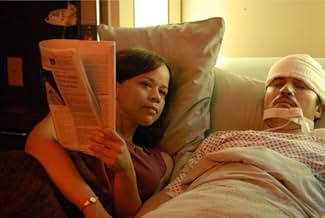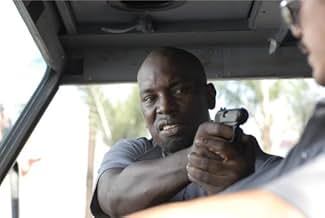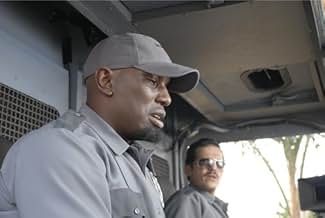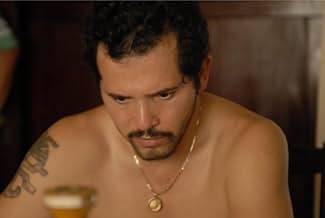CALIFICACIÓN DE IMDb
5.8/10
2.5 k
TU CALIFICACIÓN
Agrega una trama en tu idiomaAfter he's shot during a heist in East L.A., an armored truck driver wrestles with rehabilitation and tracking down the man who committed the crime.After he's shot during a heist in East L.A., an armored truck driver wrestles with rehabilitation and tracking down the man who committed the crime.After he's shot during a heist in East L.A., an armored truck driver wrestles with rehabilitation and tracking down the man who committed the crime.
- Dirección
- Guionistas
- Elenco
- Premios
- 1 nominación en total
Jessica Steinbaum
- Rosey De La Pena
- (as Jessica Steinbaum-Lopez)
Taylor Gray
- Javy De La Pena
- (as Taylor Arthur Gray)
- Dirección
- Guionistas
- Todo el elenco y el equipo
- Producción, taquilla y más en IMDbPro
Opiniones destacadas
The depictions and descriptions of the film can be read on numerous reviews here and elsewhere - but I have to say most of these writs seem determined to discredit a good film. I truly believe most can agree this is one of the best pieces of fiction best paralleling reality for L.A. filmed since (and including) Crash, Harsh Times, Training Day, etc.
Watching the deleted scenes, docu on filming, listening to commentary, and related media, they all reveal a true sense of wanting to make a non-Hollywood film with succession and an honest feeling of REALITY. Reading thru several armored car inside-jobs this film reveals a very authentic feel that deserves more credit than it is being given.
Outstanding performances by Cannavale, Perez and Gibson proving small films can bring the best out of someone. Regardless of the negative and technical reviews written about the end scenes and cultural inaccuracies - I have to give this film one of the most realistic portrayals I have seen in years centering around a man that is losing everything that makes him a man - and finds a way to regain it without being Jason Bourne or James Bond.
A worthwhile film that deserves a rent or maybe even a purchase for those from the areas of LA they film in if anything - the sex scene is probably one of the most dedicated I have watched in some time - but at the same time shows a realism that mainstream cinema has missed for years I will be recommending this title in my store for those looking for an authentic urban film.
Watching the deleted scenes, docu on filming, listening to commentary, and related media, they all reveal a true sense of wanting to make a non-Hollywood film with succession and an honest feeling of REALITY. Reading thru several armored car inside-jobs this film reveals a very authentic feel that deserves more credit than it is being given.
Outstanding performances by Cannavale, Perez and Gibson proving small films can bring the best out of someone. Regardless of the negative and technical reviews written about the end scenes and cultural inaccuracies - I have to give this film one of the most realistic portrayals I have seen in years centering around a man that is losing everything that makes him a man - and finds a way to regain it without being Jason Bourne or James Bond.
A worthwhile film that deserves a rent or maybe even a purchase for those from the areas of LA they film in if anything - the sex scene is probably one of the most dedicated I have watched in some time - but at the same time shows a realism that mainstream cinema has missed for years I will be recommending this title in my store for those looking for an authentic urban film.
Drawing on clear influences from recent gritty, crime infused pieces such as 2000's Traffic and 2002's Narc, 2008 film The Take seems to have come and gone at a Canadian film festival before being banished to stores so as to increase profits on DVDs. It would seem there was nary a distributer at said Canadian festival willing to invest in Brad Furman's film; an overall shame, not a crying one but a shame none-the-less. The Take squeezes an amount of substance to do with male machismo; the tearing apart of a family unit; the sub-genre of the vigilante movie and the dealing of the aftermath of a heist plus all the crime drama conventions of mistrust between gangsters: honour amongst thieves, if you will, into 96 minutes. However, all too often these ideas jostle uncomfortably with one another – a persistent vying for power, a struggle between genres and sub-genres; content and study. This renders The Take less interesting than it might have been, but good enough to see in order to observe a moderately interesting, well acted independent American drama.
I think the film thinks it's more powerful and more affecting than it is in actualité. The tale is of a righteous man wronged, and the subsequent fall out it has on both his life and the lives of those around him. But for all the substance, for all the promise and for all the content; to have The Take boil down to a chase sequence on foot that, again, certainly thinks it has more of a sense of drama involved than it actually does, was just a mite disappointing and anti-climatic. Furman likes his visual tricks and gimmicks, with someone somewhere failing to realise that spectacle and visualness ought to have been secondary to this screenplay's agenda as gritty, Hispanic-American living conditions; seams in a family becoming unravelled; a man loosing his mind and sense of masculinity plus brutal shootings during a heist sequence were the order of the day. Furman tells the story with every trick in the book: the visual flair ingredient to the editing and camera work; the speeding up of footage; transitions and the hand-held camera technique on top of a number of scenes set in rooms that are close to all being entirely blacked out for sake of mood.
John Leguizamo plays the role of Felix De La Pena, a man of Hispanic descent living with his wife Marina (Perez) and their two kids in Los Angeles. De La Pena is a nice, upstanding man with a great deal of fondness for his family and the work he does. His large friend-base plus the fact his job sees him adopt a certain role of honour and trust in driving an armoured truck instills a sense of responsibility on top of the other positive conventions. But one day, things go spectacularly wrong when Tyrese Gibson's criminal Adell holds up the truck; has De La Pena drive it back to the HQ before robbing the place of its money and fatally wounding De La Pena. We've seen people shot following heists in films many-a time before, usually hard-bodied; no nonsense criminals in hard boiled neo-noirs, but they'd always get back up again after a brief lay off and plough on ahead, seeking money and revenge. The Take's sequence of wounding feels grainer than usual, De La Pena's pained reaction to his injuries are stark and cutting in ways that I've rarely felt a gunshot wound in a film before. The injury feels more painful than usual because of the film's delicate buildup of the victim: a well mannered; rather slim, though not necessarily 'weak', and supremely upstanding character in De La Pena. From here, a process of recovery for both the mind, body and soul begins as FBI agent Steve Perelli (Cannavale) hunts the wrong-doers.
It's here the film beds down for a long stretch of content similar to one another. De La Pena's sense of self vanishes and he gets a lot angrier a lot more often than usual, with Leguizamo really rather brilliantly portraying this new character: this fresher, more frothing at the mouth person. He installs security equipment in a fit of paranoia and undergoes a process of long recovery that sees him sense a once-present notion of 'manliness' now gone. Subsequently, he cannot make love to his wife; gets agitated as a result and seems to maintain this odd sense of being unable to really 'feel', as if to cry or get upset at the shooting is to fatally expel a sense of male machismo, with an ideology that might read something like: 'men don't cry - men get over this sort of thing'.
I wrote a while ago in an observation on a Finnish film from 2006 entitled Lights in the Dusk about the film's over-emphasising on the 'little-guy' in a big situation. In said film, a hapless turnkey is rendered fall guy so a gang of thieves can swipe some diamonds his job it is to contain. I cited 2001's sprawling and maddening heist flick 3000 Miles to Graceland, in which during a heist sequence at a casino, countless numbers of body guards and members of law enforcement are dispatched like the many nameless, faceless bad guys that pop up at you in certain video games, each one of them as fatally injured as the next. The Take, like said Finnish film, rejects the generic notion to follow those perpetrating the heist and instead opts for an unbeaten route down into the gloomy undergrowth of a victim of the shooting recovering. Needless to say, a lot of people that were shot in 3000 Miles to Graceland would've gone through what De La Pena goes through here – it's when these sorts of films dry up that we know we're in trouble. I notice that at the present time, The Take has a lower IMDb rating than 3000 Miles to Graceland: good grief!
I think the film thinks it's more powerful and more affecting than it is in actualité. The tale is of a righteous man wronged, and the subsequent fall out it has on both his life and the lives of those around him. But for all the substance, for all the promise and for all the content; to have The Take boil down to a chase sequence on foot that, again, certainly thinks it has more of a sense of drama involved than it actually does, was just a mite disappointing and anti-climatic. Furman likes his visual tricks and gimmicks, with someone somewhere failing to realise that spectacle and visualness ought to have been secondary to this screenplay's agenda as gritty, Hispanic-American living conditions; seams in a family becoming unravelled; a man loosing his mind and sense of masculinity plus brutal shootings during a heist sequence were the order of the day. Furman tells the story with every trick in the book: the visual flair ingredient to the editing and camera work; the speeding up of footage; transitions and the hand-held camera technique on top of a number of scenes set in rooms that are close to all being entirely blacked out for sake of mood.
John Leguizamo plays the role of Felix De La Pena, a man of Hispanic descent living with his wife Marina (Perez) and their two kids in Los Angeles. De La Pena is a nice, upstanding man with a great deal of fondness for his family and the work he does. His large friend-base plus the fact his job sees him adopt a certain role of honour and trust in driving an armoured truck instills a sense of responsibility on top of the other positive conventions. But one day, things go spectacularly wrong when Tyrese Gibson's criminal Adell holds up the truck; has De La Pena drive it back to the HQ before robbing the place of its money and fatally wounding De La Pena. We've seen people shot following heists in films many-a time before, usually hard-bodied; no nonsense criminals in hard boiled neo-noirs, but they'd always get back up again after a brief lay off and plough on ahead, seeking money and revenge. The Take's sequence of wounding feels grainer than usual, De La Pena's pained reaction to his injuries are stark and cutting in ways that I've rarely felt a gunshot wound in a film before. The injury feels more painful than usual because of the film's delicate buildup of the victim: a well mannered; rather slim, though not necessarily 'weak', and supremely upstanding character in De La Pena. From here, a process of recovery for both the mind, body and soul begins as FBI agent Steve Perelli (Cannavale) hunts the wrong-doers.
It's here the film beds down for a long stretch of content similar to one another. De La Pena's sense of self vanishes and he gets a lot angrier a lot more often than usual, with Leguizamo really rather brilliantly portraying this new character: this fresher, more frothing at the mouth person. He installs security equipment in a fit of paranoia and undergoes a process of long recovery that sees him sense a once-present notion of 'manliness' now gone. Subsequently, he cannot make love to his wife; gets agitated as a result and seems to maintain this odd sense of being unable to really 'feel', as if to cry or get upset at the shooting is to fatally expel a sense of male machismo, with an ideology that might read something like: 'men don't cry - men get over this sort of thing'.
I wrote a while ago in an observation on a Finnish film from 2006 entitled Lights in the Dusk about the film's over-emphasising on the 'little-guy' in a big situation. In said film, a hapless turnkey is rendered fall guy so a gang of thieves can swipe some diamonds his job it is to contain. I cited 2001's sprawling and maddening heist flick 3000 Miles to Graceland, in which during a heist sequence at a casino, countless numbers of body guards and members of law enforcement are dispatched like the many nameless, faceless bad guys that pop up at you in certain video games, each one of them as fatally injured as the next. The Take, like said Finnish film, rejects the generic notion to follow those perpetrating the heist and instead opts for an unbeaten route down into the gloomy undergrowth of a victim of the shooting recovering. Needless to say, a lot of people that were shot in 3000 Miles to Graceland would've gone through what De La Pena goes through here – it's when these sorts of films dry up that we know we're in trouble. I notice that at the present time, The Take has a lower IMDb rating than 3000 Miles to Graceland: good grief!
mislabeled drama with little to no suspense or action; annoying music, editing, and drawn out climax
If I'd known this was categorically a drama I'd probably not have watched it. But I have a weakness for heist movies of any kind, and I really like Leguizamo, so I gave it a shot. Mistake. Now, the acting was good enough, especially from Rosie Perez, but the editing and choppy/shaky cinematography was beyond annoying, the music way too overdramatic, the action/suspense nonexistent save for the opening scene, and when it came down to it the movie was a recovery drama. As that, it wasn't too bad. Then comes the ending. The, uh, "climax." What were they thinking? A drawn out, fruitless chase scene. I'm not a spoiler reviewer which is tough here but I think I've made my point. The only way you should watch this is knowing it's a drama, and have the FF button at the ready.
The Take isn't one of those films you'll remember forever, it's plot simplistic, and script not without some flaws, but you will definitely remember the performances by the entire cast.
I always defended Leguizamo as a serious actor, while some claim he's always typecast. I knew he was talented, and he immediately sets the tension in this film. He does a great job in every scene. Rosie Perez was also intense, nice to see her always. Lequizamo drives the film, he's clearly not just a supporting actor. He deserves to be A-listed.
Another honorable mention is the directing of the film. I loved the Urban cinematography! East LA was never covered better. The old fashioned town is shown well, and gritty atmosphere adds to the already dark tale.
Overall, a good old school revenge tale, a modern western perhaps! 7/10
I always defended Leguizamo as a serious actor, while some claim he's always typecast. I knew he was talented, and he immediately sets the tension in this film. He does a great job in every scene. Rosie Perez was also intense, nice to see her always. Lequizamo drives the film, he's clearly not just a supporting actor. He deserves to be A-listed.
Another honorable mention is the directing of the film. I loved the Urban cinematography! East LA was never covered better. The old fashioned town is shown well, and gritty atmosphere adds to the already dark tale.
Overall, a good old school revenge tale, a modern western perhaps! 7/10
The Take (2007) is a film I recently watched on Tubi. The story follows an armored truck driver who is taken hostage during a heist, shot, and left for dead. After surviving, he struggles with mood swings, chronic pain, and relentless police interrogation. As his mental state deteriorates and his family life suffers, he decides he may need to solve the crime himself to regain control of his sanity.
Directed by Brad Furman (The Lincoln Lawyer), the film stars John Leguizamo (Moulin Rouge), Tyrese Gibson (Baby Boy), Rosie Perez (White Men Can't Jump), Bobby Cannavale (Boardwalk Empire), and Roger Guenveur Smith (Do the Right Thing).
The cast is impressive, and the acting exceeds expectations, especially from John Leguizamo and Rosie Perez, whose portrayal of a strained marriage felt authentic and emotional. The setup is solid, and Leguizamo's mental unraveling is well-executed. The family dynamics are a strong point and help ground the film. Tyrese's character, however, felt unnecessary, and the full-circle ending leaned a bit too far into the unbelievable. Still, the strong performances and engaging character arcs keep your attention.
In conclusion, The Take is a fairly average film but worth watching if you're in the mood for something a little different. I'd score it a 6/10.
Directed by Brad Furman (The Lincoln Lawyer), the film stars John Leguizamo (Moulin Rouge), Tyrese Gibson (Baby Boy), Rosie Perez (White Men Can't Jump), Bobby Cannavale (Boardwalk Empire), and Roger Guenveur Smith (Do the Right Thing).
The cast is impressive, and the acting exceeds expectations, especially from John Leguizamo and Rosie Perez, whose portrayal of a strained marriage felt authentic and emotional. The setup is solid, and Leguizamo's mental unraveling is well-executed. The family dynamics are a strong point and help ground the film. Tyrese's character, however, felt unnecessary, and the full-circle ending leaned a bit too far into the unbelievable. Still, the strong performances and engaging character arcs keep your attention.
In conclusion, The Take is a fairly average film but worth watching if you're in the mood for something a little different. I'd score it a 6/10.
¿Sabías que…?
- TriviaBoth John Leguizamo and Rosie Perez admitted certain scenes with them together felt uncomfortable because they are close friends and attend church together. "It was in the sex scene between husband and wife that things started to go bad. ... It was the hardest scene, very difficult," Perez said. "I respect him so much and he respects me so much. I know his wife, he knew my husband and introduced me to my boyfriend. It was very awkward. Like brother and sister having to do a sex scene."
- Bandas sonorasPo Po's Gang
Written by: Scott Nickoley, Jamie Dunlap, and Darrin Milton
Selecciones populares
Inicia sesión para calificar y agrega a la lista de videos para obtener recomendaciones personalizadas
- How long is The Take?Con tecnología de Alexa
Detalles
- Fecha de lanzamiento
- País de origen
- Sitios oficiales
- Idioma
- También se conoce como
- Bedel
- Locaciones de filmación
- Productoras
- Ver más créditos de la compañía en IMDbPro
Taquilla
- Presupuesto
- USD 800,000 (estimado)
- Tiempo de ejecución1 hora 36 minutos
- Color
- Mezcla de sonido
- Relación de aspecto
- 1.85 : 1
Contribuir a esta página
Sugiere una edición o agrega el contenido que falta


































